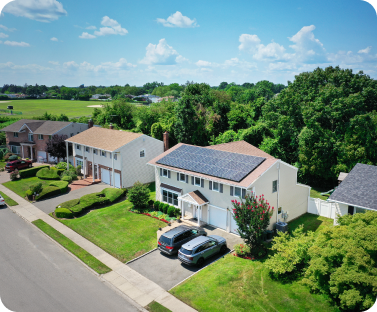Installing a solar electric vehicle (EV) charging system can be a convenient and cost-effective way to charge your electric car at home. EmPower Solar is able to integrate a solar photovoltaic (PV) system with an EV charging station for Long Island residential clients. Are you interested? Here is more information about installing a solar EV charger in your home:
Assess Your Energy Usage Needs
Energy usage analysis can determine the size of solar energy system needed to support your home’s electricity consumption and EV charging. Gather your electricity bills for the past year to get insights into your average monthly and annual electricity consumption. Our team can review your electricity bills to design a home solar energy system that meets your EV charging needs.
Your driving distance influences the energy your EV requires for daily commuting. Calculate the average daily distance you drive your electric vehicle to determine how much charging energy you’ll need. The higher the daily driving distance, the more solar energy you may need for charging. Based on your daily energy consumption, one of our solar contractors can calculate the size of the solar energy charger your vehicle requires.
Choose the Right EV Charger
You can choose from various solar EV charging stations, such as level 1 and level 2 chargers. Solar technicians can install these chargers in home garages or at dedicated charging stations on residential properties. A level 1 solar EV charger uses a standard household 120-volt outlet and is the slowest charging option. These chargers provide about 4 miles of energy per hour. The slow charging speed makes it suitable for overnight charging at home when you have ample time to charge your EV.
Level 2 chargers require a 240-volt circuit and offer better charging speeds than level 1. A level 1 charger takes 8 to 16 hours to charge an EV, while a level 2 takes 6 to 8 hours to fully power an EV. Level 2 chargers provide about 20 to 30 miles of energy per hour. This makes them suitable for households with multiple electric vehicles. Some Level 2 chargers have smart features, allowing you to schedule charging times. These features also enable you to monitor energy usage and integrate the charger with home automation systems.
System Design
You can collaborate with us here at EmPower Solar to design a solar energy system based on panel placement, orientation, and inverter capacity. Our qualified installers can identify and analyze potential solar obstacles such as trees, buildings, or other structures that could reduce energy efficiency. The ideal orientation for solar panels in the Northern Hemisphere is facing south.
Choosing the right inverter and calculating its energy capacity helps contractors create a solar PV system that maximizes energy production. Solar professionals can determine the optimal inverter capacity based on your solar panel configuration and energy goals. Modern inverters often come with monitoring capabilities that allow you to track your solar PV system’s performance, and adding a battery storage system allows you to store excess solar energy for later use.
Invest in a Solar EV Charger
Before installing a solar EV charging system for your home, EmPower Solar’s team can determine your energy usage and help you choose the right charger. Our experts can also conduct a site assessment to identify the optimal locations for installing solar panels. Contact us today to learn more about solar EV chargers and to receive a free installation estimate.
Say goodbye to high-energy bills and hello to worry-free solar

Say goodbye to high-energy bills and hello to worry-free solar
About the Author
EmPower Solar develops, engineers, installs, and services solar and battery systems for residential and commercial clients. Since 2003, EmPower Solar has empowered thousands of New York homeowners and businesses with 47 megawatts of distributed solar. Its vision is to create a new energy paradigm powered by clean, renewable energy for a more prosperous, healthy, and civil world. The company culture is defined by the EmPowering Way, which results in consistent 5-star customer service reviews. For more information visit empower-solar.com.